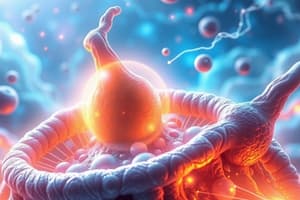Podcast
Questions and Answers
What is the primary reason cells perform respiration?
What is the primary reason cells perform respiration?
- To stimulate anabolic reactions
- To break down proteins for energy
- To produce ATP for cellular functions (correct)
- To transport water across membranes
Which of the following correctly describes catabolism?
Which of the following correctly describes catabolism?
- The storage of energy in fatty tissues
- The synthesis of proteins from amino acids
- The conversion of glucose into ATP
- The breakdown of larger molecules into smaller ones (correct)
Which stage is NOT part of the cellular respiration process?
Which stage is NOT part of the cellular respiration process?
- Krebs Cycle
- Glycolysis
- Citric Acid Cycle
- Fermentation (correct)
What is the end product of glucose oxidation in cellular respiration?
What is the end product of glucose oxidation in cellular respiration?
What is the main role of ATP in cellular processes?
What is the main role of ATP in cellular processes?
What is the byproduct produced when the kidney converts bicarbonate?
What is the byproduct produced when the kidney converts bicarbonate?
Which process occurs in the absence of oxygen where pyruvic acid turns into lactic acid?
Which process occurs in the absence of oxygen where pyruvic acid turns into lactic acid?
How many ATP molecules are produced during the Electron Transport Chain?
How many ATP molecules are produced during the Electron Transport Chain?
What condition results from the conversion of pyruvic acid in anaerobic respiration?
What condition results from the conversion of pyruvic acid in anaerobic respiration?
Which stage of cellular respiration only occurs under aerobic conditions?
Which stage of cellular respiration only occurs under aerobic conditions?
In the context of cellular respiration, what is the goal score in terms of total ATP production?
In the context of cellular respiration, what is the goal score in terms of total ATP production?
What is a common treatment for patients in shock according to the content?
What is a common treatment for patients in shock according to the content?
What is the primary function of the Electron Transport Chain in cellular respiration?
What is the primary function of the Electron Transport Chain in cellular respiration?
Which stage of cellular metabolism is the most efficient in terms of ATP production?
Which stage of cellular metabolism is the most efficient in terms of ATP production?
What is a major byproduct of Glycolysis?
What is a major byproduct of Glycolysis?
How is Carbon Dioxide mainly transported in the bloodstream?
How is Carbon Dioxide mainly transported in the bloodstream?
Which of the following best describes the Krebs Cycle?
Which of the following best describes the Krebs Cycle?
What is the least efficient stage of cellular metabolism according to the given content?
What is the least efficient stage of cellular metabolism according to the given content?
What role do the kidneys play in relation to carbon dioxide?
What role do the kidneys play in relation to carbon dioxide?
Which potential byproduct is linked with the most primitive form of glucose metabolism?
Which potential byproduct is linked with the most primitive form of glucose metabolism?
Which of the following represents a common misconception about the Electron Transport Chain?
Which of the following represents a common misconception about the Electron Transport Chain?
Study Notes
Cellular Tasks
- Cells require energy to stimulate metabolic reactions, transport substances across membranes, and perform mechanical work like muscle movement.
Metabolism
- Defined as the total of all physical and chemical changes in the body, requiring energy for various processes.
- Comprises two main categories: anabolism and catabolism.
Anabolism and Catabolism
- Anabolism: Building larger molecules from smaller units, e.g., protein synthesis from amino acids.
- Catabolism: Breaking down larger molecules into smaller ones, e.g., digestion of carbohydrates, fats, and proteins.
Cellular Respiration
- All metabolic functions demand energy, with glucose oxidation being a primary energy source.
- Key products of respiration include carbon dioxide, water, and adenosine triphosphate (ATP), which serves as the cell's energy currency.
ATP Production
- Optimal cellular function requires 36 ATP molecules; energy is generated through three stages: glycolysis, Krebs cycle, and electron transport chain.
Glycolysis
- First stage of cellular respiration; ATP stabilizes glucose for breakdown.
- Results in pyruvic acid and limited ATP production, identified as a less efficient energy conversion process.
Krebs Cycle
- Second stage; crucial for understanding energy utilization and disease processes.
- Operates in both aerobic and anaerobic environments, breaking down pyruvic acid into carbon dioxide, water, and ATP.
Carbon Dioxide Transport
- CO2 is carried from cells as bicarbonate (65%), bound to blood proteins (25%), and dissolved in plasma (10%).
- Easily diffuses through cellular membranes.
Kidneys and CO2
- Kidneys filter waste from metabolism and regulate bicarbonate levels, producing CO2 as a byproduct.
- Sodium bicarbonate treatment generates CO2, potentially raising serum blood levels.
Anaerobic Respiration
- Occurs without oxygen; glycolysis continues but leads to lactic acid production, resulting in metabolic acidosis.
Aerobic Respiration
- Requires sufficient oxygen; allows for efficient energy production from glucose in the Krebs cycle.
- Produces CO2 and ATP (2 from this stage), progressing to the electron transport chain.
Electron Transport Chain
- Final stage of cellular respiration, generating 34 ATP molecules under aerobic conditions only.
Pathophysiology and Clinical Implications
- In patients with cardiac arrest, treatment focuses on chest compressions to "prime the heart."
- Sick patients may require fluids and oxygen for conditions like shock or sepsis, maximizing cellular metabolism and recovery.
Goal of Cellular Respiration
- Aim for the highest efficiency in energy production, targeting a total of 36 ATP molecules.
Studying That Suits You
Use AI to generate personalized quizzes and flashcards to suit your learning preferences.
Related Documents
Description
Explore the essential concepts of cell metabolism and respiration in this pathophysiology quiz. Understand how cells utilize energy for metabolic reactions, substance transport, and mechanical work. Test your knowledge of these fundamental processes necessary for cellular function.





